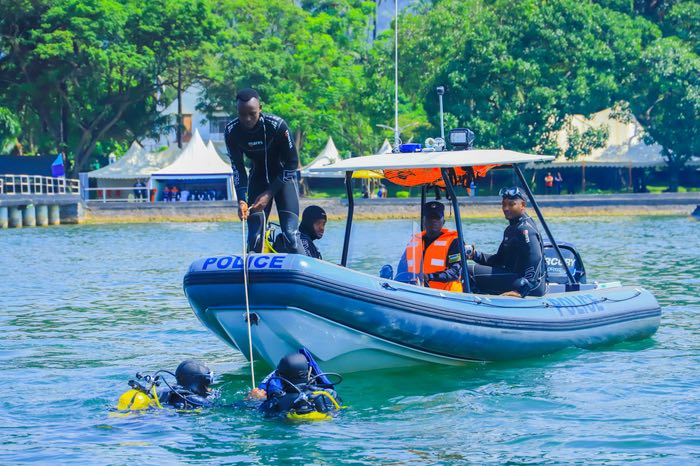
By IP Francois Mugiraneza
“At sunrise on Lake Kivu, the fishermen push off quietly, their nets coiled like secrets. For years, these shores echoed with chaos—smugglers, drownings, and vanishing boat engines. But today, a new force watches over the waters: Rwanda’s Police Marine Unit.”
Although Rwanda is landlocked, its waterbodies are vast and cut across the entire country, from east to west. The Rwanda Water Resources Board notes that over 2,100 square kilometers of the country’s landmass is covered by water.
These waterways are vital to the country’s economic and social activities, necessitating full-time safety and security measures. That’s where the Rwanda National Police Marine Unit comes into play.
Established in 2005, the Marine Unit was created to respond to rising insecurity on water—illegal fishing, theft, accidents, and cross-border smuggling. It began with just 35 officers operating from a single station in Rutsiro District, equipped with five inflatable boats (Zodiac type) and no dedicated rescue tools.
“It was a massive task for such a small team. We had to cover multiple lakes and rivers with almost nothing,” recalled Assistant Commissioner of Police (ACP) Charles Butera, the commandant of Rwanda Police Marine Unit.
Today, the unit has grown into a critical part of Rwanda’s maritime security infrastructure. It now operates 10 permanent stations across the country, covering 14 lakes and one river on a full-time basis. The number of officers has grown from 35 to over 150, and they now work with more than 15 modern boats, from the old vintage five boats.
From training to a full professional unit
In response to challenges in the country’s maritime sectors, the Rwanda National Police prioritized training and on top of basic police instruction, every new officer undergoes a specialized program tailored to water security.
“No one starts immediately,” says Chief Inspector of Police (CIP) Vincent Ntamahungiro, who oversees training. “They must learn swimming, vessel navigation, water rescue, self-defense, and how to assist victims of water accidents.”
The training also covers maritime law enforcement, first aid, boat engine mechanics, use of firearms in water environment and emergency evacuation procedures. “We even train them in firefighting and ethics, and once they finish the basic training, more advanced courses follow,” CIP Ntamahungiro added.
This approach has led to faster, more effective response times. Depending on distance and conditions, officers can now arrive at emergencies within 10 to 30 minutes—crucial in preventing loss of life and property.
What causes most accidents?
According to ACP Butera, the most common accidents in waterbodies are drownings, often due to recklessness and lack of suitable equipment by fishermen or commuters. Reports indicate that many incidents stem from preventable mistakes—overloading boats, lack of swimming skills, and failure to wear life jackets.
“People often don’t check if their engine works or if they have enough fuel. Sometimes they ignore weather warnings or exceed passenger limits,” he explained.
To combat this, the Marine Unit now trains local cooperatives and boat operators in basic water safety. They teach users to inspect vessels before boarding, limit passenger numbers, and always wear life jackets. “It’s about prevention, not just reaction,” he says.
In the early years, the unit had no divers. Today, it boasts a trained team—including women—capable of underwater search and rescue. “We’re still expanding,” ACP Butera notes. “Our goal is to be closer to the public, with more stations, better tools, and constant readiness.”
Operations, community policing, and benefits
For communities living near Lake Kivu, Lake Burera, or Lake Mugesera, the Marine Unit’s impact has been transformative. Jean Baptiste Nsengiyumva, a fisherman in Rutsiro’s Kigeyo Sector, remembers a time when waters were ruled by chaos.
“We were often attacked by thieves—armed with machetes, stealing our nets, engines, even fish,” he recalls. “People died. But since the Marine Police came, everything changed. We feel safe now.” He praises recent operations in which police recovered stolen boat engines and returned them to cooperatives.
Florida Mukamazera, who leads an association of fishing cooperatives in Rubavu, agrees. Her members once feared crime on the water, but that fear has faded. “Police check for life jackets, boat safety, and compliance with passenger limits,” she says. “They respond quickly and take crime seriously.”
Despite improvements, some crimes remain persistent—illegal fishing, assaults, and border-related smuggling among them. “We still face challenges,” says ACP Butera. “Some try to cross borders illegally. Others fish without licenses, conflicts between fishermen among others.”
The unit tackles these issues with public cooperation. “We can’t reach every place at once,” he says. “That’s why community reports are important. The people living by these lakes are our first line of defense.”
The unit also works closely with water users—fishermen, transporters, tour operators, and researchers. Through education and trust, they help reduce accidents and detect crime early.
Future prospects
Looking ahead, the unit is intensifying its public education efforts. Fishermen’s cooperatives are being trained on water safety, boat maintenance, and emergency response. Partnerships with local leaders are helping identify suspicious activities early.
As Nsengiyumva puts it, casting his net as the sky brightens over Lake Kivu: “We’re no longer alone out here. The lake still holds danger, but now—so do the people who guard it.”
With support from the public and ongoing investment in equipment and training, Rwanda’s Police Marine Unit is quietly redefining water safety in a region where water often meets danger. (End)
